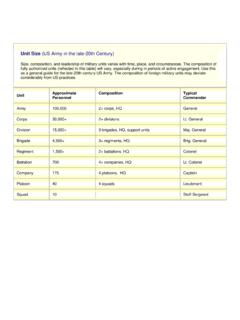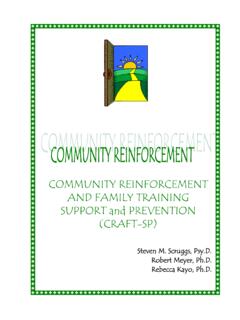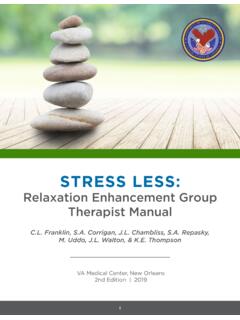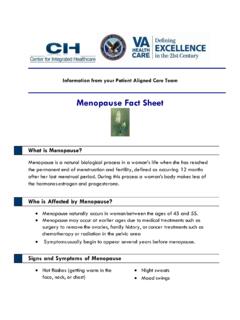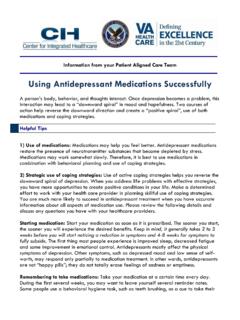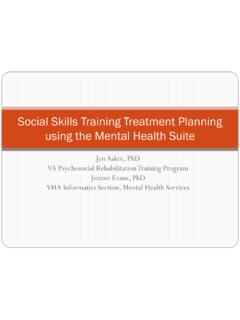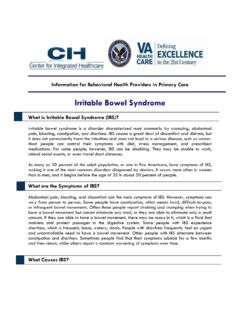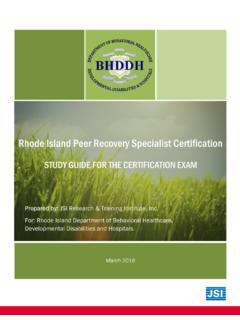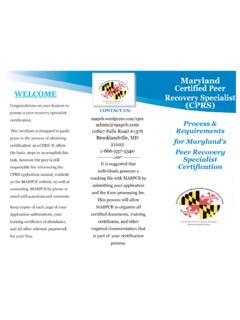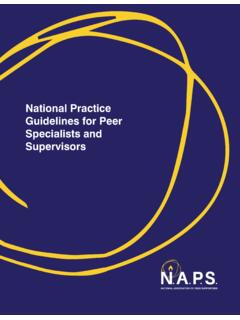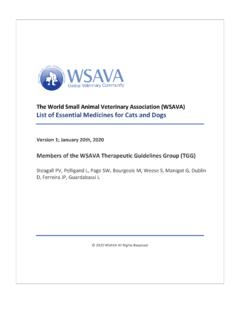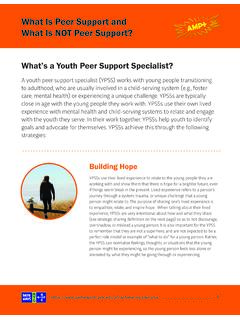Transcription of Effective Communication Skills Key to Success in a Peer …
1 Effective Communication Skills : Key to Success in a peer Specialist's Work on an Interdisciplinary Team Anthony Russo, Certified peer Specialist Patricia Sweeney, , CPRP. New England MIRECC peer Education Center Necessity of Effective Communication in Providing peer Support Services in VHA. This is important because: Results are important when working under pressure or time constraints. Communicating in an Effective manner with Veterans and other health care providers can be a valuable timesaver and produce the desired results. Critical care life issues can become the norm in the life of a Veteran who is in recovery . Effective Communication and timely responses to the Veteran's concerns can relieve undue anxiety, stress, and worry for the Veteran and help connect him/her to needed services and resources.
2 Effectively communicating as a member of an interdisciplinary team is important because it ensures that all members of the team are well-informed regarding a Veteran's health care services and results in a level of continuity of care that has been proven to be most beneficial in the lives of the Veterans that we serve. VETERANS HEALTH ADMINISTRATION. Communication within an Interdisciplinary Team You will need to interact effectively with other health care professionals on your team and with staff on other interdisciplinary teams in order to fulfill your roles and responsibilities as a peer specialist working within VHA. Sometimes, in an effort to advocate for yourself or a Veteran who you are assisting, you may find yourself communicating with another staff member who does not share your opinion on an issue.
3 How you negotiate conflicts with colleagues is important. Benefits to being collaborative and solution-oriented in your communications with other staff: Promotes a positive work environment and other staff will want to work with you Keeps up morale Encourages open lines of Communication in order for the interdisciplinary team to function and serve Veterans' needs and interests. VETERANS HEALTH ADMINISTRATION. Related VHA peer Support Staff Competencies Here are some of the expected knowledge and Skills for VHA peer specialists that are related to Effective Communication Skills . Communication Domain peer Support Practices Domain Practices patience, kindness, warmth, and dignity with Develops collaborative relationships with Veterans as part of everyone that the peer specialist interacts with in his/her a treatment team to assist Veterans' engagement with services that are beneficial to their recovery .
4 Work. Uses respectful, strengths-oriented language in Managing Crisis and Emergency Situations Domain interpersonal interactions with Veterans, Veterans' Provides reassurance and support to Veterans in distress families, and colleagues as well as documentation of the and works collaboratively with colleagues to connect the Veterans with clinical providers' services when needed. peer specialist's work. Recognizes when to ask questions or share personal Workplace Skills Domain experiences and when to listen. Participates as an active member in interdisciplinary team discussions. Asks open-ended questions that allow more information Demonstrates Effective Communication Skills and to be shared and can allow an individual to discover professionalism in use of technologies (ex.)
5 Phone, email). his/her own inner wisdom. Listens to others with careful attention to the content Cultural Competence Domain and emotion being communicated. Demonstrates understanding of how race, ethnicity, spirituality, gender, sexual orientation, military background, Demonstrates understanding and validates others' socioeconomic status, and other subcultural influences can experiences and feelings. impact an individual's belief systems, interpersonal Communicates in a timely manner with other members interactions, and approach to recovery . of a Veteran's treatment team and shares all relevant Demonstrates understanding of own personal values and culture and how they may contribute to beliefs, judgment, information needed to assist the Veteran with his/her and biases in how to approach the peer specialist's work.
6 Goals and current needs. Demonstrates capability in interacting sensitively and VETERANS HEALTH ADMINISTRATION effectively with individuals from various cultural backgrounds. Brief Refresher: 4 Basic Communication Skills Each of these Skills can help you communicate more effectively in your role as a peer specialist in VHA: (Figure 1: The Four Communication Skills , ). VETERANS HEALTH ADMINISTRATION. Brief Refresher: Thinking Remember: Effective Communication takes planning and preparation. Have a desired objective of what you want to achieve in the Communication (ex. asking for help with a task; sharing relevant information with others). Plan the main points that you want to convey.
7 Have a clear idea of how you will convey your points to optimize timeliness and effectiveness (ex. email, phone call, or in-person Communication ). Be as concise and precise as possible with your message. VETERANS HEALTH ADMINISTRATION. Brief Refresher: Verbal & Nonverbal Communication (Figure 2: Timmins, ). Verbal Communication : Use of questions, supportive statements, and minimal encouragers (ex. Uh-huh, Tell me more ) encourage the conversation to continue and deepen. Nonverbal Communication : Communication is not just about what we say. Our facial expressions, tone of voice, movement, appearance, eye contact, gestures, and posture all play a part in how we communicate with others.
8 VETERANS HEALTH ADMINISTRATION. Brief Refresher: Open-Ended & Closed-Ended Questions Open-Ended Questions: Asked in a way that elicits more comprehensive answers. Open-ended questions usually begin with What, How, When, and Where.. Examples: How can I help you today? What could we do to solve this issue? . Close-Ended Questions: Usually begin with Is, Do, Are, and Were and call for brief, Yes / No . types of answers. Close-ended questions can be helpful (or not) depending upon the length of time available for the interaction and the information you need to obtain. For interactions that are brief, close-ended questions are useful for obtaining needed information quickly.
9 Examples: Are you going to the staff meeting tomorrow? Do you want me to call the Veteran to remind him about the appointment? Is (name of staff member) here today? . VETERANS HEALTH ADMINISTRATION. Brief Refresher: Tips about Nonverbal Communication Maintain a relaxed posture while sitting or standing. Nod your head occasionally to demonstrate that you are listening. Maintain culturally appropriate eye contact. Keep your tone of voice neutral, positive, and relaxed. Face the person speaking to you. Maintain a friendly expression. Move away from any physical barrier (ex. desk, table) between you and the person with whom you are speaking. Avoid nervous mannerisms like: o Restlessly moving in your chair when sitting o Fiddling with keys, pens, pencils, coins, etc.
10 O Drumming your fingers and/or tapping your feet VETERANS HEALTH ADMINISTRATION. Brief Refresher: Listening Give your complete attention to the other person. Be silent! Allow the other person space and time to talk. Think about what you are hearing while you listen to the person. Listen for the feelings and meaning behind the words being spoken. Listen with an open mind. Refrain from passing judgment on the other person. Respect the other person's right to feel the way he/she feels and to think the way he/she thinks, even if the person's viewpoint differs from your own. VETERANS HEALTH ADMINISTRATION. Brief Refresher: Speaking Avoid responding in a manner that demonstrates judgment and closes Communication (ex.)
